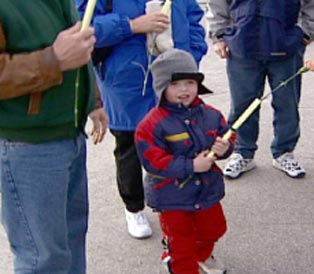|
Facilitator's Guide for
THE BELOVED COMMUNITY
A film by Pamela Calvert/Plain Speech
At the fenceline of Canada's "Chemical Valley," girls
are being born at twice the rate of boys. How do you stay in the home
you love when the price you pay may be your children's future?
PLANNING A SCREENING
Topics and Issues Relevant to THE BELOVED COMMUNITY
As you plan your screening, you might consider speakers, panelists, or
discussion leaders who have expertise in one or more of the following
areas:
- Children's Health
- Community Organizing
- Corporate Social Responsibility
- Endocrine Disruptors
- Environmental Justice
- Globalization
- Green Chemistry
- Human Rights
- Native Culture, History & Land Rights
- Precautionary Principle
- Reproductive Health
- Toxic Exposure & Health Impacts
- Workplace Health and Safety
As You Plan Your Event
A screening of THE BELOVED COMMUNITY can be used to spark interest
in any of the topics listed above, as well as to inspire individual and
community action. Using the checklist below will help ensure a high quality
and high impact event.
Set realistic goals.
Will you host a single screening or use the film to spur ongoing efforts?
Will you steer a panel or discussion toward a specific topic or let the
participants pursue whatever issues they choose? Be sure to include your
event partners in the decision making process. Being clear about your
goals will make it much easier to structure the event, target publicity,
and evaluate results.
Structure your event to match your goals.
Do you need an outside facilitator? If your goal is to share information
beyond what is included in the film, are there local experts on the topic
who should be present? How many participants do you want? (Large groups
are appropriate for information exchange. Small groups allow for more
intensive dialogue and action plans.)
Arrange to involve all stakeholders.
It is especially important that people be allowed to speak for themselves.
We encourage you to seek out 'unlikely alliances' and push your own comfort
zone, going out of your way to invite representatives of all the constituencies
with a potential stake in building a healthy and sustainable community.
Once the group is assembled, make sure that all participants have a chance
to be heard and are treated with respect.
Choose an accessible venue.
If you are bringing together different constituencies, is your venue 'neutral
territory'? Is it in a part of town that is reachable by various kinds
of transportation? Does the physical configuration of the room allow for
the kind of discussion you hope to have? Can everyone easily see the screen
and hear the film? Is the room comfortable?
Leave time for feelings.
When the lights come up, people may have a strong emotional response to
the film. This is where people make the empathetic connections that make
all the following work possible, so it's important to encourage that personal
response before moving on to questions of strategy. The conversation will
naturally flow into "What do we do now?"
Leave time to plan for action.
If you want your screening to have lasting impact, it is important to
leave time to plan action. People will be looking for something that is
immediate, concrete, and local. Planning next steps can help people leave
the room feeling energized and optimistic, even when the discussion has
been difficult. It's also important to be prepared to facilitate networking.
Provide a sign-in sheet at the door so people can share contact information
like email addresses. Let participants know exactly how that information
will (and won't) be shared. Let participants know whether or not press
will be present.

Facilitating a Discussion of THE BELOVED COMMUNITY
People who feel safe, encouraged, respected and challenged are likely
to share openly and thoughtfully. As a facilitator you can encourage that
kind of participation. Here's how:
Be prepared.
View the film before your event. This will both give yourself time to
reflect so you aren't dealing with raw emotions at the same time that
you are trying to facilitate a discussion, as well as letting you check
the DVD and equipment to make sure there are no technical glitches. You
may want to refer to the Discussion Guide
to get you started.
Be knowledgeable.
You don't need to be an expert on globalization or environmental justice
to lead an event, but knowing the basics can help you keep a discussion
on track and gently correct misstatements of fact. Prior to your event,
take time to check the Background Information and Suggested Resources
in the film guide handout.
Be clear about your role.
Being a facilitator is not the same as being a teacher. A teacher's job
is to convey specific information. In contrast, a facilitator remains
neutral, helping move the discussion along without imposing her or his
views on the dialogue.
Know who might be present.
It isn't always possible to know exactly who might attend a screening,
but if you know what kinds of groups are present in your community, you
might be able to predict who might be represented. You can also keep in
mind that issues can play out very differently for different groups of
people. Factors like geography, age, race, religion and class can all
have an impact on comfort levels, speaking styles and prior knowledge.
Take care not to assume that all members of a particular group share the
same point of view.
THE
BELOVED COMMUNITY is a co-production of Plain Speech and Detroit
Public Television, and is distributed by California
Newsreel. All rights reserved. For more information: contact@newsreel.org www.newsreel.org
This
guide was developed with the support and participation of many people.
Special thanks to Elizabeth Crowe and Ron Plain.
|







